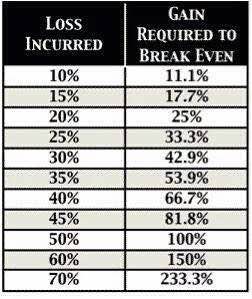-
 Bsplindia.com
Bsplindia.com
- The neuro-behavioral
science trading edge
-
-
-
-
-
- Are you trading too
hard???
-
- Vijay L Bhambwani
Sept 12,
2016
-
-
Coming from a business family has its advantages. I had the opportunity
to learn about success traits at an early age, from successful
businessmen who had actually achieved what others aspired to achieve.
The one thing that I heard repeatedly is that if a deal is too laborious
to chase and conclude, and if the returns are expected to be average, it
is better to give it a pass. Ancient wisdom has advocated - fatigue
makes a coward of the bravest soldier in battle. So conserving energy is
important, more important is efficient allocation of energy. Your
efforts should yield maximum profits in the least amount of time and
with controlled risk parameters. In the jungle, a lion has to outrun the
slowest deer from the herd to be able to feed on it. Its not interested
in outrunning the fastest deer. Its not even needed to. In short, choose
the low hanging fruits, the "easy" trades, ride them well and let your
profits run, but only to the point where the trajectory & velocity of
the present trade is better than alternate trades available. At the same
time, any trading system you program, must be able to quantify that
metric.
-
-
Enter the trade efficiency ratio (TER). Its a tool a savvy trader uses
to gauge how much effort + costs he / she puts in to earn a Rupee in
profits, after all execution costs & taxes put together. You then take a
ratio of net profits versus the costs incurred. (the formula for MS
Excel lovers = profit after costs / all execution costs = TER). In
short, you are endeavoring to gauge how much profit you take home after
yielding money to the brokers, trading exchanges and the government. As
a capitalist, you should try to raise your share of the take home
profits and curtail the share of the others (brokers, exchanges &
govt.). The higher the trade efficiency ratio, the better for you. For,
we all get hit by a sucker trade once in a while and that's where the sh*t
hits the fan. We get emotional, make mistakes, get into a lean phase and
surrender profits to the market forces. A trader with a high TER is
better placed to tide over a bad patch. Imagine if you take meager pot
shots at the markets (low TER), even with a high success rate, one or
two sucker trades take away almost your entire months earnings. How many
times we feel this way - "its so difficult to trade for a living. I take
weeks to make X amount, invariably to give it back in 2 losing trades."
Many traders even experience the situation where execution costs were
paid out of pocket, or were a majority component of that months drag on
the profit & loss account. I have felt this way plenty of times. Then
your mind gets into the voyeurism mode - if only the STT / service tax /
exchange levies / stamp duties rates were lower, I would have still
turned out a small profit. If only algos were not so active, my
performance would have been better. But a deeper investigative analysis
pointed the needle of blame at me !!! I was pulling the plug too early,
too fast on winning trades and multiplying my efforts to keep finding
new trades and seek alpha. When the inevitable loss making sucker punch
of a trade hit me, I was exhausted from all that over trading and
reacted late / too late and the chasm of losses would widen. 1 - 2
losing trades were knocking clean a fortnight of profits. I have made
that mistake umpteen number of times in the past, and am guilty as
charged !!!
-
-
The strategy was changed thereafter. Any trade that promised a TER of
less than 2 at the outset was was a no-no. Of course, things can
go wrong, and they will, and you may have to "kill a trade" earlier on
sudden developments, but the rule of the thumb stays. I'm not interested
in trades < 2 TER. Believe me, there will be variations. Inspite of this
so called rule, the market forces have ensured that I went from 8.5 TER
to (-) 2 TER on my trades. But the net result was >2 TER. You need to
aim for the sky to be able to climb a mountain. That gave me ample
cushions to weather any losing trade/s for that month and also cut out
many trades that I would have taken hitherto in a desperate search for
absolute alpha. I cut out fatigue and frothy efforts to earn pennies at
the risk of dollars. We also revisited brokerage slabs with our brokers
and anyone not giving deeply discounted rates no more gets our business.
Costs have to be down by the trader. Because profits are dependent on
the markets forces and not on the traders aspirations. So atleast one
aspect of the cost - profit equation is under your control.
-
-
Take a look at the herculean task a trader sets out for himself after he
loses money. The graphic itself is borrowed from the timeline of a FB
contact. While the figures are daunting, they are not entirely as
honestly fearsome the real life situation is. Allow for the execution
costs, psychological pressure-to-perform and the mounting odds against
the trader and you see what you need to do first foremost and always -
focus on not losing money or you will be chopping your limbs off in the
market place. Profits are always a secondary objective. While it may
sound odd to most traders, that is exactly what professional traders do.
And when they do, they go for the chunky, meatier trades. When visiting
McDonalds, would you rather eat the burger or only the ketchup? Its self
evident really, high TER trades are the way to go forward.
-
-

-
-
This is one step amongst many towards trading smarter rather than
trading harder. I would rather leave the trading harder part to the
other guy out there. Give me my >2 TER trades, or none at all.
 Bsplindia.com
Bsplindia.com
 Bsplindia.com
Bsplindia.com